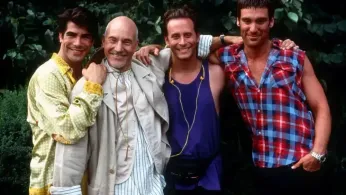
3 hours ago
‘Jeffrey’ Turns 30: Revisiting the Comedy That Redefined Gay Cinema
READ TIME: 3 MIN.
When "Jeffrey" premiered in August 1995, American queer cinema was at a crossroads. The AIDS crisis loomed heavily over the LGBTQ+ community, and most portrayals in mainstream media were somber, marked by tragedy and loss. Into this landscape stepped "Jeffrey," a romantic comedy that dared to find humor and hope amid the uncertainty, earning both critical acclaim and a devoted following among queer audiences .
Written by Paul Rudnick and directed by Christopher Ashley, the film was adapted from Rudnick’s off-Broadway play. It stars Steven Weber as Jeffrey, a thirty-something gay man in New York who, overwhelmed by the fear of AIDS, decides to become celibate. His resolve is tested when he meets Steve, played by Michael T. Weiss, a charming and openly HIV-positive man. The film’s eclectic cast also includes Christine Baranski and Patrick Stewart, whose comedic and heartfelt performances brought multidimensional queer characters to the screen at a time when such representation was rare .
"Jeffrey" stood out for its bold decision to address HIV/AIDS not just with gravity, but with laughter. Its protagonist’s journey—struggling with intimacy, desire, and fear—resonated deeply with viewers who saw their own anxieties reflected and gently lampooned. The film’s humor was never at the expense of empathy; instead, it provided catharsis, showing that queer life could contain both joy and pain, even in the darkest times .
A memorable scene featuring a campy AIDS benefit hoe-down, led by Baranski’s character, typifies the film’s blend of satire and sincerity. Ultimately, it is Jeffrey’s willingness to embrace love—despite risk and uncertainty—that delivers the film’s enduring message: queer people deserve romance, happiness, and visibility, even and especially in a world that often denies them those things .
The ensemble cast of "Jeffrey" was unusual for its time, bringing together established and emerging actors to tell an unapologetically queer story. Patrick Stewart, best known then for his role as Captain Picard on "Star Trek: The Next Generation," won praise for his comedic turn as Sterling, a flamboyant interior designer. His participation signaled a growing acceptance of LGBTQ+ narratives in mainstream entertainment and helped draw wider audiences to the film .
The film’s release was met with both acclaim and controversy. Some critics noted its lighthearted tone as a refreshing change, while others wondered if comedy was an appropriate vehicle for exploring the ongoing AIDS crisis. However, for many viewers—particularly within the LGBTQ+ community—"Jeffrey" offered rare visibility, humor, and hope at a time when these were in short supply .
Three decades on, "Jeffrey" is remembered not just as a product of its time, but as a film that helped change the conversation around queer love and loss. Younger generations discovering the movie today are often struck by its frankness, wit, and its embrace of imperfection. In an era when LGBTQ+ cinema is more diverse and visible than ever, "Jeffrey" remains a reminder of how far the community has come—and the laughter that helped along the way .
As fans celebrate the film’s 30th anniversary, retrospective screenings and online tributes highlight its enduring appeal. For many, "Jeffrey" is more than just a comedy; it is a testament to resilience, a celebration of queer love, and a milestone in LGBTQ+ storytelling.






